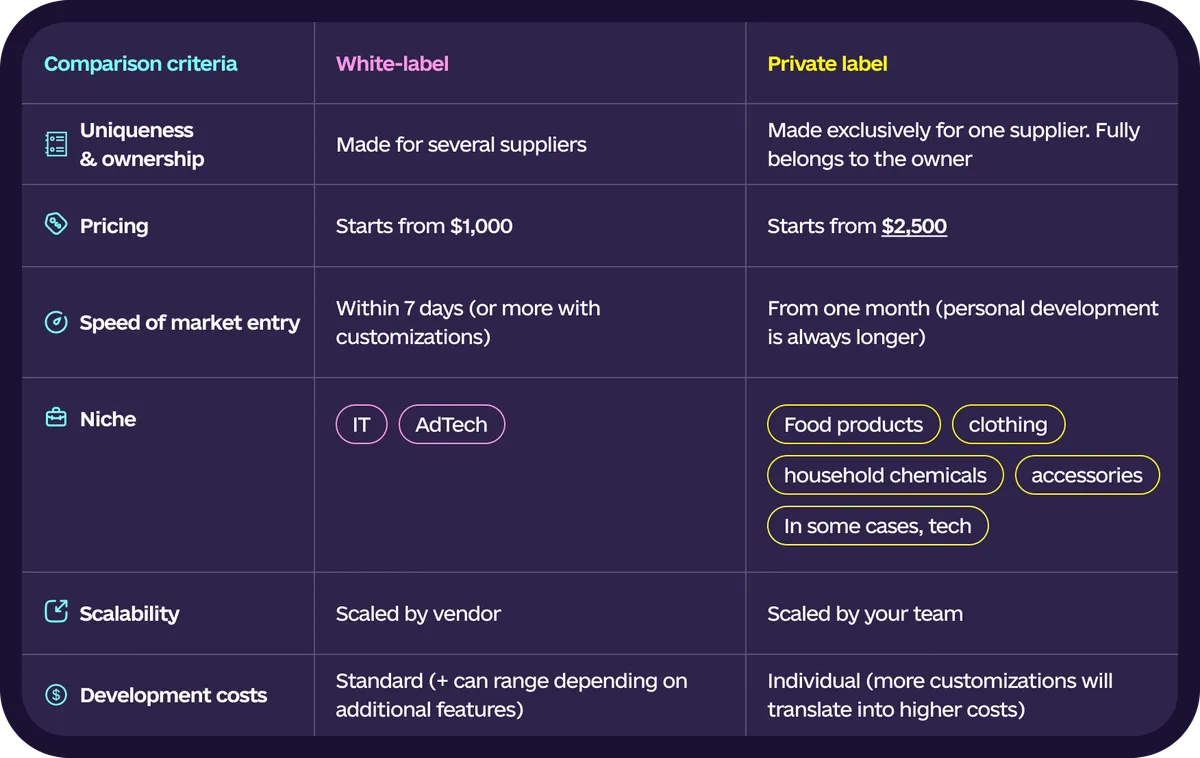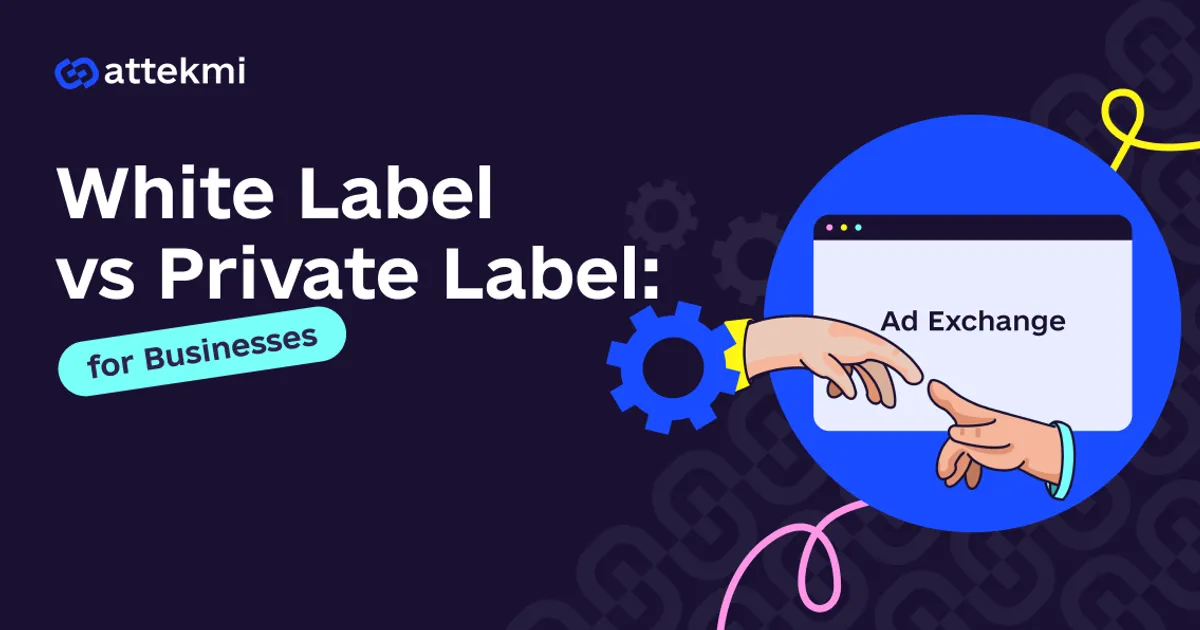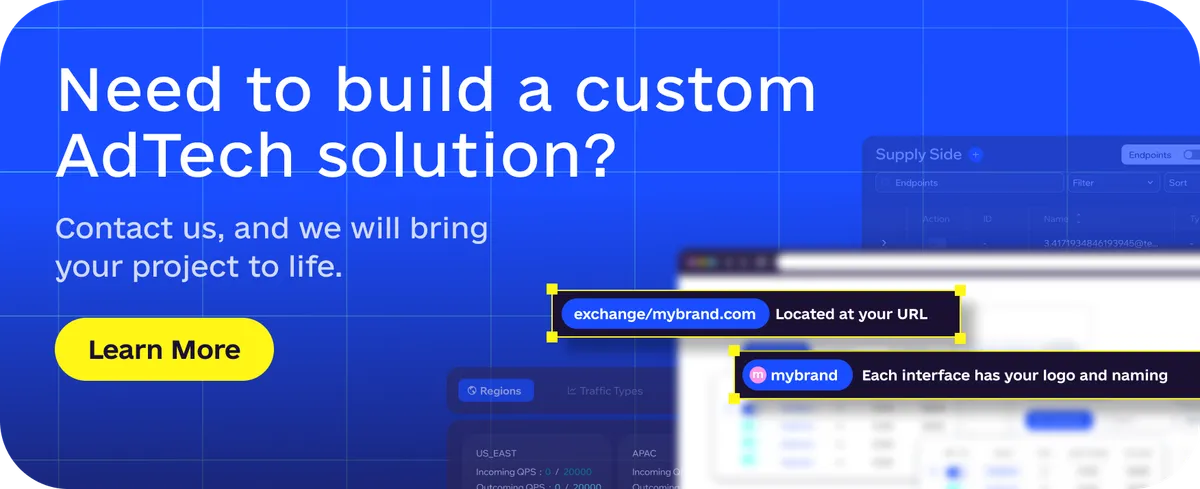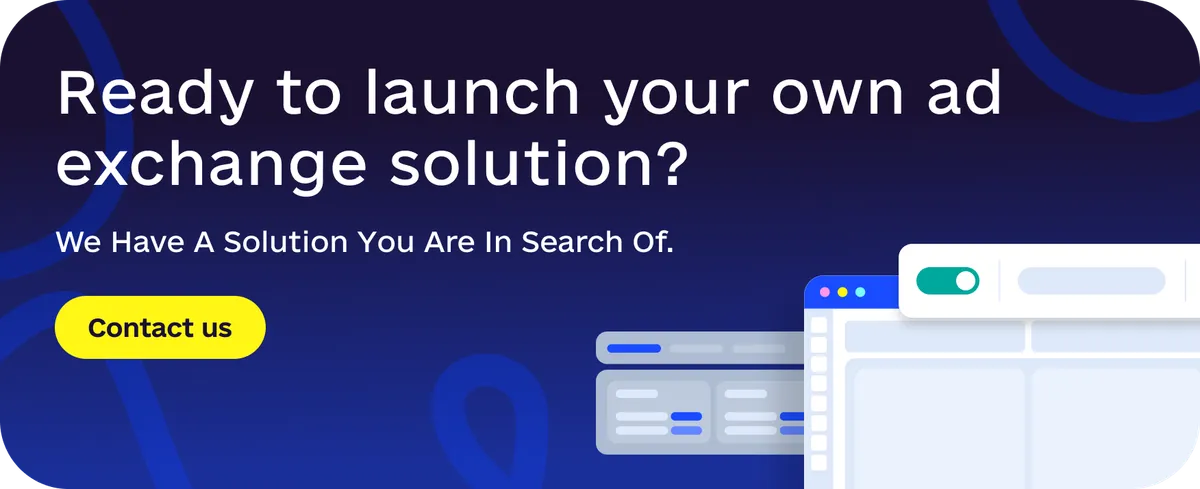While offering ultimate control and reduced dependence on third-party providers, in-house software development is usually a pretty expensive and time-consuming process. Moreover, that is not only about building software – creating anything from the ground up on your own involves a lot of challenges. Fortunately, there are alternatives to consider, and white label and private label models are on the list.
But what are the differences between private label vs white label? Which option is the best for your business?
Operating in the AdTech industry since 2018, we have vast experience in creating and customizing white label ad exchange solutions. In addition, we provide custom AdTech development services, so we know everything about white labeling and private labeling.
In this guide, we dive deep into the pros and cons of these popular business models and provide guidance on choosing the most suitable option. Keep reading to learn more to make the right choice.
Key Takeaways
According to the private label model, a product is created by a third-party company considering all the client’s requirements. The client has full control over the processes and owns the product.
With the white label model, a company can customize a product created by a different business and sell it under its own brand.
White labeling is a good choice in case you require quick time to market and have limited resources.
Private labeling can be the right option when you need to build a strong and unique brand.
With Attekmi’s White Label Ad Exchange, you can enter the market in the shortest time possible and start earning on media trading straight away.
What is white label and how does it work?
White label is a type of partnership where one company manufactures goods or IT products or provides services, and another business sells them under its own brand. This way, the reseller does not have to build and maintain a product on its own – instead, this brand can focus on marketing, branding, and sales. In terms of software, this model is especially beneficial since IT products require maintenance and regular updates to remain competitive.
How white labeling works
Company A is involved in producing a particular product or providing services. This could range from food and beverages to electronics, software, or hosting services. Company B purchases the fully packaged product from Company A, brands it with its own name, and sells it.
In our case, the “product” is an ad exchange that is typically manufactured by one big tech vendor and then rented or purchased by a smaller company or startup.
In this arrangement, Company B saves resources by not having to build everything from the ground up. Company A, meanwhile, gets additional perks as such collaboration becomes an additional source of income for the manufacturer.

Examples of white labeling
While white labeling is more popular in the software-related industries, it still works across diverse niches:
Attekmi’s partner chooses our White Label Ad Exchange. The UI is personalized, and several custom features are developed according to the partner’s requests.
A company offers white label website hosting services, and other businesses can provide these services under their own brands.
Clothing items like t-shirts or hoodies are often white labeled by manufacturers, so that retailers can customize them.
Companies producing and processing coffee beans often allow other businesses to sell their coffee beans under their specific brands.
What is private label and how does it work?
Private label is a strategy where a company sells products under its own brand name, but these products are manufactured by a different business. Thus, the selling company is a brand owner, while the provider is responsible for production. Companies that utilize private label manufacturing services include trading companies, manufacturing companies diversifying their market offerings by selling products, and non-network retailers interested in reducing the cost of certain goods.
How private labeling works
Products (including software) under a private label are manufactured by a producer but belong to the client – the owner of the private label.
This model implies that the original product can be modified or developed absolutely from scratch and then adjusted to the specifications of the client. Then, it is bought from the online store. This is the most common model that is used in commerce.
The category of private label products includes items both under the original brand of the retail organization and those with a different name but exclusively available within the product range of that organization.
For instance, a retailer might opt for a private label product to present a comparable style of clothing at a more affordable price compared to other renowned apparel brands. In this scenario, pricing serves as a pivotal factor, enabling the retailer to gain popularity over competitors by offering a similar product aesthetic at a more budget-friendly cost.
The terms “white label” and “private label” are often used interchangeably. However, the difference between them lies in who determines the content of the product or service.
With white label, the manufacturer fully determines the composition, specifications, and packaging, while the client only specifies the branding on the product. The manufacturer may release the same product under their own brand or under other trade names.
On the other hand, a private label is fully developed by the manufacturer according to the specifications provided by the client.
If there might be a white label vs private label dilemma in AdTech, with private label, everything is almost always pretty straightforward – this model is frequently used in retail and eCommerce.
Examples of private labeling
Here are several examples of how the private label model works:
Attekmi’s partner opts for our custom AdTech development services. We build the solution from scratch and maintain it, and the partner is the owner of the platform.
Many supermarkets have their own private label product lines and sell diverse goods under their own brand, along with the products from other manufacturers.
Smartphone accessories like chargers or cases are also often manufactured according to the private label model.
White label vs private label: 7 key differences
Now, as we’ve already understood the essence of both models from the above-mentioned descriptions, it’s time to proceed to a more in-depth consideration to distinguish between them. Let’s fully plunge into the comparison.

So, white label and private label products are ready for a challenge; let’s see their peculiar features.
Price
The products created based on the WL model are more widely spread in the market, as they are sold by multiple retailers. Due to their prevalence, such products can be priced lower for consumers compared to private label ones. To sell WL products to retailers, sellers must carefully plan their marketing strategy, as similar products are sold by multiple companies.
According to Amazon, you should invest significant funds in the production of a private label product and further promotion. For example, on average, Amazon sellers spend $2,500 or more on launching private label products, whereas a standard WL product’s cost may start from $1,000 (depending on the product, provider, and additional custom features).
Uniqueness
With the WL model, the brand or logo of the manufacturer is removed from the final platform or product, and instead, the buyer’s mark is applied. A private label vendor can produce a unique version of what white label is capable of. A retailer using this concept will normally turn to a third party to create a product that will differ in appearance or characteristics from similar goods.
With this, it is worth remembering that a lot will depend on the particular vendor that you collaborate with. Among WL professionals, many offer quick-to-deploy standard solutions. However, some of those vendors, like Attekmi, can offer a lot of customizations, including non-standard integrations, further ad platform scaling, and feature development.
Speed of market entry
White label software enters the market faster because sellers only need to attach their own brand to them, and they are ready to go – all set, fully working, and prepared. The entry of white label products into the market is faster also because retail sellers already have all the necessary licenses for sale, whereas selling products with private labeling may take time. In the case of software or AdTech platforms, it is especially valuable.
Niche of specialization
Let’s look at some white label and private label examples. In the case of white label, companies often sell software platforms like SSP, DSP, or ad exchange, as well as MarTech platforms like CRM or social media management platforms. Although WL can also span cosmetics and electronics, the tech specialization of this model is more prevalent.
On the contrary, private label is usually applied to food products, household chemicals, clothing, and accessories.
Development cost
The development and production of products under the private label model are generally more expensive for the seller because the products are unique. For this reason, the higher the seller’s expenses, the higher the cost of the finished result.
It is a common practice for retail sellers to modify the characteristics of private label products to make them more competitive.
Scalability
Let’s review another differentiation between white label vs private label products – scalability. Private label in the technology niche is technically a completely unique product that fully and entirely belongs to its owner. Because of this, the owner is also responsible for growing and developing technology.
Yes, in the WL model, the owner is also in charge of solution scaling when the business grows out of current capacities. However, WL platform owners face fewer technical challenges as, normally, WL providers already have a working path for migration to bigger capacities. For example, Attekmi’s White Label Ad Exchange offers an easy transition to bigger QPS plans without affecting platform functioning or requiring terminations in the operation cycle.
Popularity
Interestingly enough, when we talk about Europe and North America, we can see that businesses are more willing to work with private label as they might be more familiar with this concept. Private labels have garnered greater popularity there, constituting 36% of fast-moving consumer goods sales in Western Europe during the second quarter of 2022, in contrast to Latin America’s 2.3%.
While there are no available statistics for private label vs white label comparison, the ever-increasing demand for apps in certain industry niches (e.g., banking) has given rise to unprecedented growth. For instance, the White Label ATM market is a multimillion-dollar industry with a huge growing CAGR (2022-2023), which applies to such regions as North America, South America, the Middle East, and Europe.
Build or buy? 3-step ad-exchange launch checklist
So, private vs white label. What to choose when you need an ad exchange solution? Before we provide any specific recommendations, here is a short checklist for you to start with. Note that while white labeling is a more popular option when it comes to tech platforms, private labeling can still be considered.
Define your goals
The first step to take is to define your goals and requirements. For instance, this can be establishing a strong, unique brand, diversifying your current product line, and so on. Apart from short-term objectives, consider long-term ones, as well as the desired time to market. With a white label option, you will be able to launch your solution much faster. Thus, when you need to choose between white label vs private label products, the required time to market plays a crucial role.
Analyze your budget and resources
Then, you need to estimate your budget and resources: pay attention to all the aspects, including upfront investment, ongoing cost (like maintenance), and marketing expenses. From our experience, white label solutions are cheaper and less resource-intensive to launch.
Understand your customization needs
In addition, you should define your customization and ownership needs. White label products vs private label solutions imply different levels of control. However, many things still depend on the provider. For instance, with Attekmi, your white-label ad exchange solution does not simply get branded. You can request custom features and get a platform fully tailored to your needs.
Keep in mind that choosing a white label option implies not only faster time to market but also quicker payback. For instance, ExplorAds, one of our partners, achieved payback in 1 month and 487% ROI in 4 months.
Private label vs white label for ad exchange: choose your best fit
Ad exchanges are quite complex technological platforms, the construction and launch of which are, to put it mildly, neither quick nor cheap. However, programmatic purchases today account for approximately 70% of all known types of purchases, making the launch of a platform in this niche incredibly attractive.
Both methods considered today can significantly simplify the life of an entrepreneur who wants to open their own platform. At the same time, it is important to know which determining factors to take into account when choosing between white label vs private label.
Budget & resources
Do you have the essential resources and budget to set up a unique platform? Is it important to you that it is unique? If both answers are yes, then your choice is a private label. If your resources and budget are limited, you can get a working platform with a white label.
Brand identity – control & ownership
Do you need full control over your solution, including branding, features, etc.? Do you require ownership? If yes, then private label can suit you better. A WL platform is labeled as your own, too, but the technology itself is provided by another party. However, it is still branded, and, if you choose the right provider, like Attekmi, you can count on some custom features as well.
Speed of market entry
Do you need to enter the market ASAP? If so, your solution is white label. Private label products are created according to the individual vision and plan, which requires more time. Plus, such a product will require licensing, and the WL platform is a licensed and risk-free option.
Future plans – long-term goals
Do you plan to scale and grow the platform? If yes, it will be easier with the WL platform provider. With a private label, it will be performed by your team.
In a nutshell, in the AdTech market, white label is mostly chosen by those companies that need a working solution installed ASAP, while private label is preferred by those who strive to get a platform that is most tailor-made to their unique requirements.
Attekmi as your white label expert
How does white labeling work in AdTech? At Attekmi, we know everything about this. We offer an entire range of ad exchange products, including the White Label solution. However, it stands out among other WL products. Why? The reason for this is that our White Label Ad Exchange is a fully customizable solution, from UI personalization to custom on-request functionality development. Everything is under your control – provide us with your requirements, and we will create the ad exchange you need. Other characteristics that make our White Label Ad Exchange stand out are as follows:
All the essential ad formats are supported: banner, video, audio, native, and CTV ads.
All the environments you need: desktop, mobile web, in-app, and CTV.
Advanced targeting and filtering settings to match demand and supply with ultimate precision.
Cross-integration bidding capabilities, such as VAST to RTB and vice versa.
Compliance with standards like GDPR, COPPA, and others.
Additionally, we deliver ongoing support and service (that earned multiple awards, by the way). We guide you all the way through, starting from our first consultation and indefinitely.
FAQ
The white label technology is easy to use and set up, and it is handled and constantly upgraded by the vendor, while the branded platform works as your own solution. The private label offers more control, differentiation, and potential for a unique market position. However, it requires more investment and time.
Private label and white label are both more advantageous than building from scratch. Still, the prebuilt nature of the WL solution typically reduces installation efforts and, thus, costs. Additionally, there are no ongoing operational costs, including hosting, maintenance, and any necessary updates or enhancements to the platform.
Within both models, you must navigate a complex regulatory landscape, including privacy, consumer protection, and industry standards. Search for a vendor that will be fully adjusted to all of them, like Attekmi, and willing to help you out when you need additional guidance and consultation.
 By Anastasiia Lushyna
By Anastasiia Lushyna

